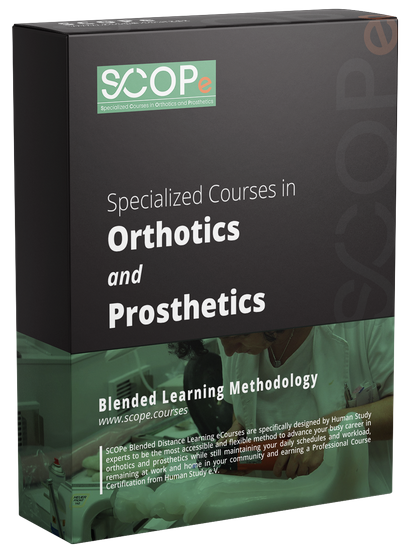
WHAT IS SCOPe?
SCOPe Blended Distance Learning eCourses are specifically designed by Human Study experts to be the most accessible and flexible method to advance your busy career in orthotics and prosthetics while still maintaining your daily schedules and workload, remaining at work and home in your community and earning a Professional Course Certification from Human Study e.V.
SCOPe Blended Distance Learning eCourses utilize an innovative curriculum design supporting participants to both build new skills and enhance existing professional skills and competencies.
Participants in SCOPe eCourses typically network, share experiences and learn together with O&P clinical colleagues from across the globe.
All programs are focused on the most technically current and/or advanced methods of patient care and services, using examples and demonstrations from daily contemporary practice.
Through a dynamic mix of video and lectures, quizzes, hands-on clinical practice and comprehensive follow up, participants can integrate their new skills into daily practice immediately.
SCOPe has courses to suit both the new and the advanced clinical practitioner.
WITH SCOPe YOU CAN
Participants have opportunities to network, share experiences and learn with people with similar interests from across the globe.
- Online and onsite learning
- Learn everything you want
- Learn from top experts
- Become P&O Professional
UNIQUE BLENDED LEARNING SYSTEM
SCOPe courses have been specially designed to be the most accessible and flexible way to build your career in orthotics and prosthetics.
SCOPe courses utilize an innovative curriculum design to support participants to both building new skills, and to growing their existing skills and competencies to effectively meet the needs of their communities as orthotic prosthetic practitioners.
With SCOPe these skills are built bit by bit through a series of short, highly specialized courses which can be taken one at a time whilst maintaining employment.
Each participant acquires credentials to be enrolled to the Human Study web-based learning platform to participate in the online activities.
This period lasts between five (5) and eight (8) weeks (according to subject area) and covers interactive theoretical content, video material and weekly online meetings for live lectures and discussions.
Each participant also gains access to platform tools such as forums, direct messaging and the glossary.
The online period allows the participants to organize their studies according to their own pace and timing, in order to facilitate personal and professional needs. (a-synchronous)
For the on-line based e-learning portion, participants will be enrolled to the
Human Study proprietary virtual classroom/internet platform, to study and review specific multi-media content.
The content areas delivered through the e-learning part will vary according to the subject matter of the course selected.
In general, theoretical content includes aspects of
- Anatomy/Physiology
- Pathology
- Biomechanics
- Professional Practice
- Material Science
Since the program is delivered parallel to the job, it is important to know that the average time needed to follow the online studies does not exceed 6h per week.
Once the theoretical e-learning portions are completed, the hands-on clinical workshop will be implemented on-site.
The ultimate goal of the clinical hands-on instructions and training is that each participant will manufacture an individual device (according to subject area) under close monitoring of the expert trainers/instructors.
The trainer/instructor will perform the clinical hands-on demonstration in a step-by-step approach covering all aspects of the treatment circle, including the fabrication/finishing process as well as the patient fitting, adjusting and testing. Participants are encouraged to immediately reproduce the demonstrated techniques under close monitoring of the trainer/instructor. Participants perform the entire fabrication process, from the patient intake and anamnesis up to the testing, fitting and analysis of the final device.
Clinical instruction and training workshop will follow individual requirements to meet the specific needs of each subject area and will be proctored by renowned prosthetic and orthotic experts.
The clinical instructions and training on-site (workshop) last between five (5) and nine (9) days. It takes place at a centralized local P&O facility where Human Study experts will provide detailed hands-on instructions and training ultimately leading participants to replicate the demonstrated techniques under close supervision of the trainer team.
Following the clinical workshop on-site, participants will be engaged to replicate the techniques learned treating patients at their home facilities and to present their comprehensive case studies to the trainer team by online presentation.
During this follow-up period, participants present up to three (3) clinical case presentations based on the learned techniques. These presentations are reviewed and discussed online with the trainer team and fellow participants in the class.
This period lasts for three (3) months and participants are encouraged to follow-up with the trainer team on the lessons and techniques learned during the on-site activities, once they have returned to their home workshop facilities. In addition, each participant is invited to prepare up to three (3) clinical case presentations according to the newly learned techniques for peer to peer and teacher review and discussions.
Case presentations are delivered through a Power Point template format provided by the course. The review and discussion take place during live sessions (synchronous), analyzing procedures and results, thus acquiring valuable feedback from the group with the trainer as moderator.
SCOPe primarily aims at P&O professional clinicians who are already functioning on-the-job, but are interested to acquire additional state-of-the-art knowledge and clinical skills that will not only escalate their own performance, but will especially and directly benefit the patients they are serving.
If you are new to the field of orthotics and prosthetics, then the basic courses are a great place to start!
If you already have an orthotic/prosthetic qualification, then the advanced courses will extend your knowledge and enable you to build competency in new areas, increasing your scope of practice.
Training candidate requirements:
- At least 1-year of clinical working experience in the prosthetics/orthotics profession
- Accessible computer and internet access
- Good English language linguistic level with a professional/technical working proficiency (bi-lingual course delivery is possible and may be available upon early request).
At the end of each course, Human Study offers the opportunity to sit for an examination.
The mandatory presentation of at least one (1) case presentation during the online follow-up period and a successful pass of the final theoretical examination will lead to the provision of a Human Study Certificate of Achievement verifying satisfactory completion of all course requirements.
To help ensure that you are able to satisfy continuing education requirements of your country, SCOPe can apply in advance to your local Certification Board for continuing education credits.
Once you have completed the required number of SCOPe Courses, you may be eligible to sit the ISPO Category 2 (Associate Prosthetist Orthotist) Exam. Contact your SCOPe Team for detailed information.
The individual courses offered by SCOPe are specific by each subject area and tuition is calculated on an individual basis. The calculation considers relevant factors such as the number of e-learning weeks for the theoretical content, duration of the clinical on-site workshop, number of participants, etc. Please contact your SCOPe Team for pricing information.
Subscribe SCOPe to learn new skills

